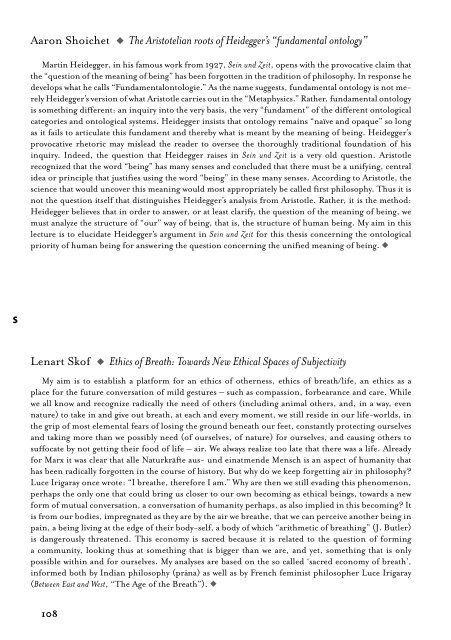Verlag.Buchhandel.Service. - Österreichische Gesellschaft für ...
Verlag.Buchhandel.Service. - Österreichische Gesellschaft für ...
Verlag.Buchhandel.Service. - Österreichische Gesellschaft für ...
Sie wollen auch ein ePaper? Erhöhen Sie die Reichweite Ihrer Titel.
YUMPU macht aus Druck-PDFs automatisch weboptimierte ePaper, die Google liebt.
S<br />
Aaron Shoichet ◆ The Aristotelian roots of Heidegger’s “fundamental ontology”<br />
Martin Heidegger, in his famous work from 1927, Sein und Zeit, opens with the provocative claim that<br />
the “question of the meaning of being” has been forgotten in the tradition of philosophy. In response he<br />
develops what he calls “Fundamentalontologie.” As the name suggests, fundamental ontology is not merely<br />
Heidegger’s version of what Aristotle carries out in the “Metaphysics.” Rather, fundamental ontology<br />
is something different: an inquiry into the very basis, the very “fundament” of the different ontological<br />
categories and ontological systems. Heidegger insists that ontology remains “naïve and opaque” so long<br />
as it fails to articulate this fundament and thereby what is meant by the meaning of being. Heidegger’s<br />
provocative rhetoric may mislead the reader to oversee the thoroughly traditional foundation of his<br />
inquiry. Indeed, the question that Heidegger raises in Sein und Zeit is a very old question. Aristotle<br />
recognized that the word “being” has many senses and concluded that there must be a unifying, central<br />
idea or principle that justifies using the word “being” in these many senses. According to Aristotle, the<br />
science that would uncover this meaning would most appropriately be called first philosophy. Thus it is<br />
not the question itself that distinguishes Heidegger’s analysis from Aristotle. Rather, it is the method:<br />
Heidegger believes that in order to answer, or at least clarify, the question of the meaning of being, we<br />
must analyze the structure of “our” way of being, that is, the structure of human being. My aim in this<br />
lecture is to elucidate Heidegger’s argument in Sein und Zeit for this thesis concerning the ontological<br />
priority of human being for answering the question concerning the unified meaning of being. ◆<br />
Lenart Skof ◆ Ethics of Breath: Towards New Ethical Spaces of Subjectivity<br />
My aim is to establish a platform for an ethics of otherness, ethics of breath/life, an ethics as a<br />
place for the future conversation of mild gestures – such as compassion, forbearance and care. While<br />
we all know and recognize radically the need of others (including animal others, and, in a way, even<br />
nature) to take in and give out breath, at each and every moment, we still reside in our life-worlds, in<br />
the grip of most elemental fears of losing the ground beneath our feet, constantly protecting ourselves<br />
and taking more than we possibly need (of ourselves, of nature) for ourselves, and causing others to<br />
suffocate by not getting their food of life – air. We always realize too late that there was a life. Already<br />
for Marx it was clear that alle Naturkräfte aus- und einatmende Mensch is an aspect of humanity that<br />
has been radically forgotten in the course of history. But why do we keep forgetting air in philosophy?<br />
Luce Irigaray once wrote: “I breathe, therefore I am.” Why are then we still evading this phenomenon,<br />
perhaps the only one that could bring us closer to our own becoming as ethical beings, towards a new<br />
form of mutual conversation, a conversation of humanity perhaps, as also implied in this becoming? It<br />
is from our bodies, impregnated as they are by the air we breathe, that we can perceive another being in<br />
pain, a being living at the edge of their body-self, a body of which “arithmetic of breathing” (J. Butler)<br />
is dangerously threatened. This economy is sacred because it is related to the question of forming<br />
a community, looking thus at something that is bigger than we are, and yet, something that is only<br />
possible within and for ourselves. My analyses are based on the so called ‘sacred economy of breath’,<br />
informed both by Indian philosophy (prāna) as well as by French feminist philosopher Luce Irigaray<br />
(Between East and West, “The Age of the Breath”). ◆<br />
108


